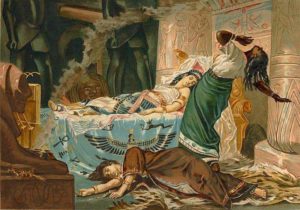I think I read Huck Finn in grade ten.
What stunned my class most about the book was the casual attitude the characters had toward slavery. I mean, how could they not know that slavery was an evil? Nothing could have been more clear to us, nothing. Slavery was pretty much the most evil thing we could think of, and it was mind-blowing to imagine that this wasn’t vividly reflected in the experience of our ancestors.
And so we figured that people back then must have been hateful and stupid monsters, willfully acting in their own best interests at the cost of others. And so we judged everybody in the book, imagining ourselves morally superior to the louts, trolls and insane people who populated the past.
But this didn’t make any sense.
There was absolutely no reason for me to think I had a more finely developed sense of morality than anybody who came before me. There must have been some decent people who participated in slavery and had no idea that what they were doing was wrong, no? They were simply living in the world into which they were born, and to them slavery, like the weather or landscape, was an unexamined fact of life rather than a conscious act of moral will.
This seemed clear to me. I was not unique. I was like everybody else, and that, of course, is a very scary thing to admit to oneself.
Technology has accelerated and amplified our culture in ways that are inconceivable. Every year it seems that the world has changed more than in all the previous millennia stacked before it. It’s dislocating, and I often think of technology, in particular our online lives, as an emergent dimension we don’t yet understand or know how to interact with. Whenever we’re uncomfortable or bored with our physical lives, however briefly, a smart phone serves as a magic wand we can wave to take us to this other realm, and put in that context, none of us should be surprised to find discontent, even anger there.
Our desire for social justice has far outstripped our ability to deliver it, and in many ways I see ideological conflicts as dimensional clashes rather than moral ones. By the standards of today, so much of what we as a society did just ten years ago seems appalling, but as we judge it’s worth remembering that ten years ago we had no idea what we were doing was wrong or unfair. We were just operating within the framework of time and place. So how then to police this if every generation, indeed, every person, is going to be witlessly complicit in ghastly acts ?
Of course, revolution is not about justice, it’s about change.
And as the future and the past battle for supremacy in a ruined present, it seems that the only way it can end, the only way it has always ended, is like in a Shakespearean tragedy—everybody on stage dies, and then, the world purified and laid bare, is seized by those, now done with watching, who had been waiting in the wings.




Comments
One response to “Huck Finn”
Refreshingly free of Tom Sawyer’s whitewash.